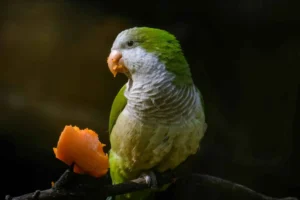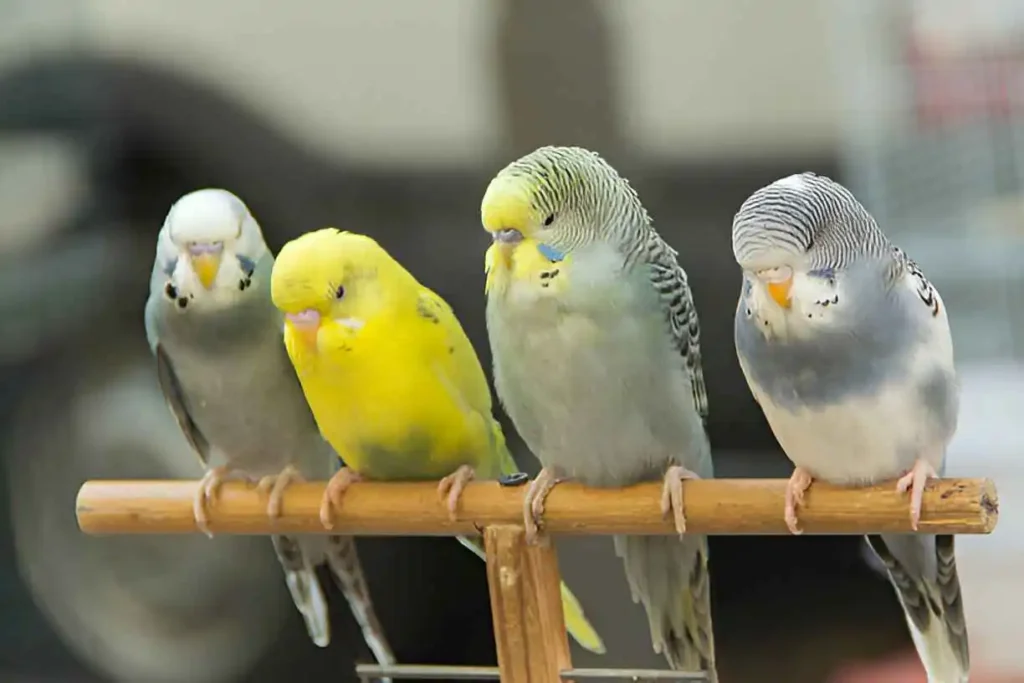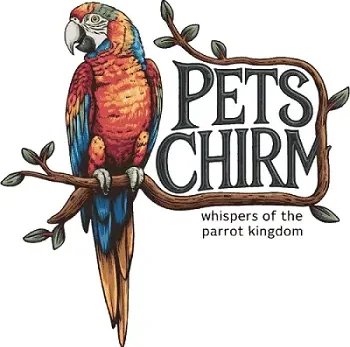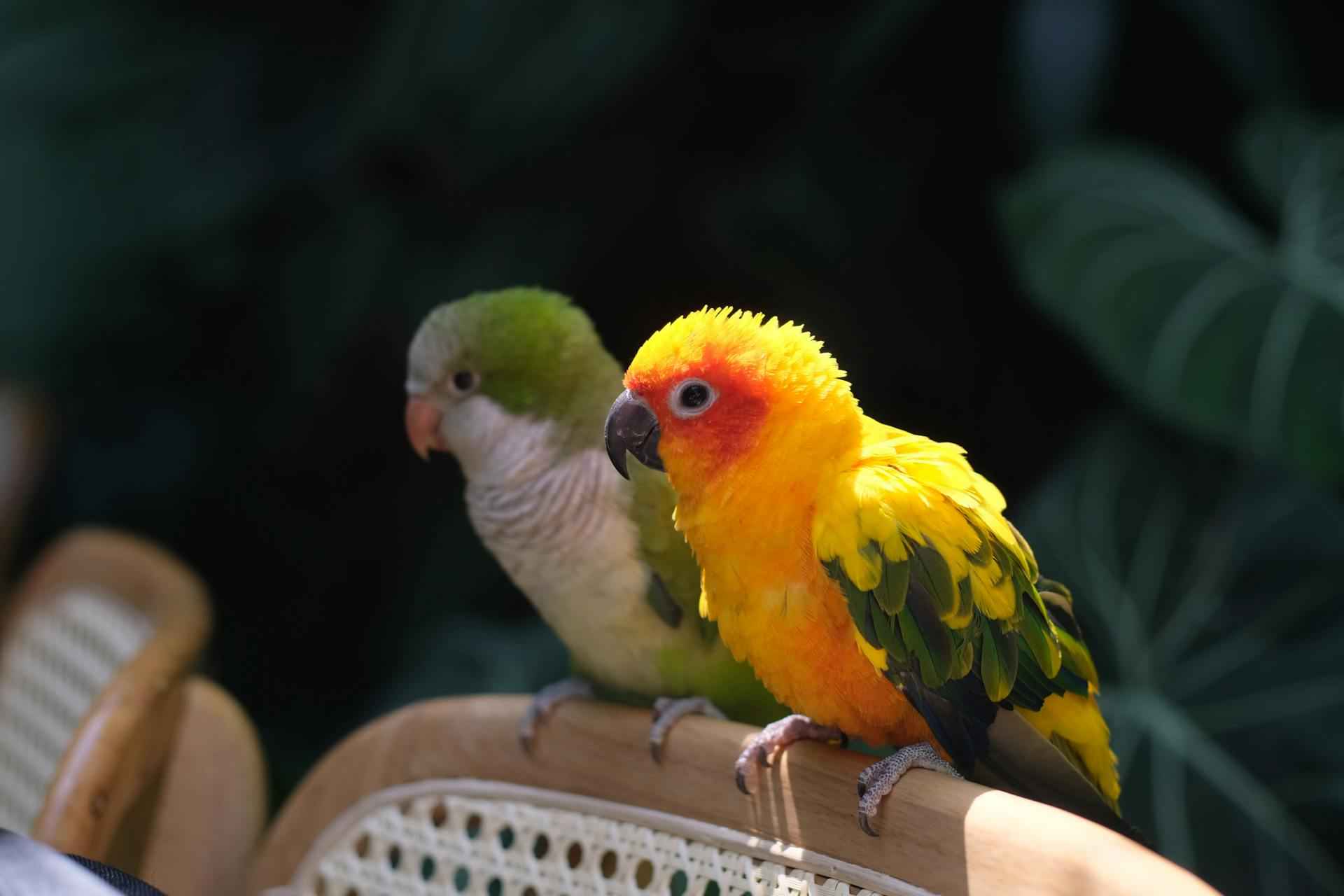Quaker Parrots also known as Monk parakeets are native to South America with a good combination of beautiful colors on their body having green feathers with a white front body which makes their body attractive personality.
Some general questions asked about Quaker Parrots are
- How Long Do Quaker Parrots Live
- Do their Wild and Captive Quaker parrots have any lifespan difference
- If yes, then why do both of their average lifespan have a difference?
Comparative Analysis: Lifespan Differences Between Wild and Captivity
The answer to the question of how long Quaker parrots live is that, when we look at the average lifespan of Quaker Parrots, Quaker Parrots can live up to 20-30 years on average, while an average wild Quaker Parrot life is just 20 years on the other hand a captive Quaker Parrot has a lifespan of up to 30 years. Here’s a huge difference in both of their lifespan.
The reason behind the great differences in the average lifespan which is about 10 years is because of several factors that influence their lifespan, these factors may be environment, stress, diet, wild attacks, and several other reasons that influence their life in different ways.
Life at home and life in the forest have huge troubling differences.
Impact of Stress and Environment on Lifespan
The environment is the main reason for their lifeline. The ratio of stress is linked with the environment, and the environment mostly decides the stress ratio.
When we talk about wild Quaker parrots they mostly build their nests on trees whether trees are in urban areas or in forests, so their nuts their life, and their baby life are easy targets for predators. Moreover, bad weather is enough to destroy their nests in seconds which they hardly build up in days and in weeks.
When we talk about captive parrots the poor environment which is not a sunny area or more fresh oxygen is available that increases their stress level. Moreover, not freely the freedom to fly also increases their stress level. In the case of wild Quaker parrots, they also face stress due to limited food, an easy target for predators due to their open location while having a small size parrot increases their stress level.
Comparing Life Quality: Wild vs Captive Quaker Parrots

The question that how long Quaker parrots live in the wild and in captivity depends on their lifestyle.
Here is a more precise and general overview of both Quaker parrots’ lives as pets and those free in the wild.
Role of Diet in Captive & Wild Quaker Parrots Lifespan
- Wild Quaker parrots feel starvation and they find themselves without food. If there is winter and everything is covered by snow they find a huge difficulty in searching their food. Wild parrots don’t rely on the same diet they have the opportunity to enjoy different diets.
- Captive parrots don’t feel much difficulty in finding food, their owners provide them food, but sometimes the parrot relies on the same and same diet given by his owner which makes them bored. Moreover, parrots demand some special type of diet that can fulfill their nutritional requirements.
Environment Role In Their Lifespans :
- Wild parrots make their nests in trees, whether the tree is in the forest or the urban area. But they feel several difficulties like bad weather can easily destroy their nests in seconds which they build in weeks, moreover for construction trees are cut down so their life is not easy especially when they have babies on their nests.
- Captive parrots have a little advantage over wild parrots in that sense, they have a good home, their nests are pre-built, and are available in cages. But they feel several limitations that they don’t fly outside freely mostly parrot owners keep their pet birds 24 hours home.
Predators and Threats to Wild Quaker Parrots’ Longevity
- Wild parrots are easy targets for parrots, their nests, their baby parrots or baby birds are easy targets for predators like snakes who easily eat their eggs while Quaker parrots are small so they can’t save themselves by fighting hawks and other predators
- Captive parrots have a good advantage in the sense of a safe environment from predators. If their cage is big in size then it’s very difficult for predators like cats to attack them but if their cage is small in size then there is a little chance that predators (mostly cats) attack them.
Health Problems Faced by Parrots:
In the wild, Parrots and birds face health problems no one is there who knows that they have some health issues which is why they die mostly due to health problems, sometimes new weather causes some health problems, and sometimes insufficient nutrient requirements cause some health problems like Vitamin A deficiency which is very important for their body.
For Captive Pets like Parrots and birds, their owner gives them a proper diet and if their pet birds feel health issues they give them proper treatment from a Vet.
From all these comparisons, a detailed analysis with facts it’s clear that captive parrots have more facilities in comparison with wild parrots that’s why captive parrots live a good life range of around about 30 years.
Common Misconceptions About Quaker Parrot Lifespan
Here are some misconceptions or myths related to Quaker Parrots or the general parrot’s lifetime.
Some of them are given below.
Wild And Captive Parrots Have the Same Lifespan?
It’s wrong that both have the same lifespan. It’s correct both are the same species but both face different environments, diets, other factors, etc.
Captive Parrots are Better Than Wild Parrots
The Captive parrots have the advantage that they have someone who takes their care, their diet, their health, and their protection but they sacrifice their freedom for this On the other hand wild parrots have freedom but they take care of everything by themselves.
Captive parrots live longer but they need mental stimulation to remain active and stress-free and it’s important for them to provide them a quality life.
Quantity(Age) doesn’t matter, the thing that matters is Quality.
How Proper Care Can Extend a Captive Quaker Parrot’s Life
Proper care can extend a parrot’s or any bird’s life in several ways:
- They have a good protection from predators.
- They don’t feel starvation.
- They get love from the owner.
- They get the best diet and fresh water all the time.
- If they are involved in any disease, they get proper treatment from a vet.
Because of these reasons for proper care, an average captive parrot’s life can extend to 10 years from wild parrots who just live up to 20 or 22 years
Summary: How to Help Your Quaker Parrot Live a Long Life
In summary, if you get a parrot or bird, first you browse for your pet bird what they like/dislike, and how to take care of them if you are new. then arrange a well-balanced diet full of nutrients, give him affection, and build a trustful relationship with him.
Take care of him if he gets any disease and treat him well. Moreover, also take care of them in extreme weather like sunny or cold weather and maintain a good room temperature for them. To train a parrot is quite difficult but proper time and patience is required, you should follow some steps to train them at the pro level.
Use Aviator Parrot Harness and allow him to fly in outside and give him a chance to fly in your control and complete his desires of flying which he can’t in the cage.
If you want to know more about Parrot Kingdom click here

| Aspect | Wild Quaker Parrots | Captive Quaker Parrots |
|---|---|---|
| Average Lifespan | 20 years | 30 years |
| Diet | Varied, subject to seasonal changes; may face starvation | Consistent, provided by owners; must be balanced to prevent boredom |
| Predators | High risk from natural predators (e.g., snakes, hawks) | Minimal risk if housed safely |
| Health Care | Limited, self-care, vulnerable to diseases | Regular vet visits, proactive health care |
FAQs
1- How long do Quaker parrots live?
Quaker parrots can live up to 20- 30 times, with interned parrots generally living longer than their wild counterparts.
2- What’s the lifetime difference between wild and interned Quaker parrots?
Wild Quaker parrots generally live around 20 times, while interned Quaker parrots can live up to 30 times due to better care and smaller pitfalls.
3- Why do interned Quaker parrots live longer than wild bones?
interned Quaker parrots profit from harmonious food force, protection from bloodsuckers, regular veterinary care, and a controlled terrain, reducing stress and health pitfalls.
4- Do wild Quaker parrots face further health issues than interned bones?
Yes, wild Quaker parrots frequently face health challenges due to environmental factors, lack of medical care, and nutritive scarcities, while interned parrots have access to veterinary care and a balanced diet.
5- What can possessors do to help their interned Quaker parrots live longer?
furnishing a balanced diet, regular veterinary check-ups, social commerce, internal stimulation, and a safe terrain can significantly enhance the lifetime of interned Quaker parrots.
If you’re interested in gardens then you should visit these websites shimmerwise

